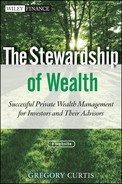Chapter 16
Investing in Private Equity
Whereas public equity refers to securities we can buy on the open market, private equity (PE) refers to interests in businesses that are privately held.1 In other words, these are businesses that are culturally similar to the businesses that made most wealthy families wealthy.
Families invest in such businesses by buying limited partnership interests in ventures managed by individuals who are skilled in acquiring, improving, and growing such businesses. If the business being acquired is a mature enterprise, probably a spinout from a larger company, we are investing in a buyout. If the business is quite new and untested, we are investing in a venture capital deal. We can also invest in mezzanine deals (loans to middle-market companies) or distressed deals (companies in need of a turnaround).
PE is very much a skills-based business, and the skills required for success are not broadly available. One important result of this fact is that only a small percentage of the PE deals being marketed are worthwhile. And as true as this is in buyouts, it's even more true in venture. Thus, if you are interested in investing in PE, keep these three words firmly in mind: access, access, access.
The reason we want to invest only in the best partnerships is that the average PE partnership produces returns that are roughly in line with those of long-only equity managers. This dramatically undercompensates investors for the leverage, risk of loss, and illiquidity of PE investments, which can take 10 years (or a lot more) to play out. According to FLAG Capital Management, top quartile PE partnerships—that is, those whose investment results place them in the top 25 percent of all partnerships—outperform average PE funds by 1,500 basis points (15 percent) per year.2 Clearly, those are the funds families will want to invest in, but gaining access to them is almost impossible for most family investors. PE funds tend to prefer large institutional investors as limited partners, believing that family investors tend to be less sophisticated and more fickle. Lack of access to the best PE firms is the main reason that most family investors in private equity don't earn returns anywhere near what they need to compensate for the risks they have taken.
Like it or not, then, the first rule of PE investing for most family investors is to invest via a best-in-class PE fund of funds. Families tend to hate funds of funds, but the best of them (granted that there aren't many good ones) will bring many benefits to justify their extra layer of fees. However, the key benefit is the one just mentioned: access to the best partnerships, a benefit we can't do without. (I discuss this issue in greater depth later.)
